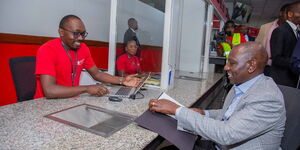A group of observers drawn from the African Union (AU) on Thursday expressed satisfaction with the voting process so far.
Led by former South African President Thabo Mbeki, the observers noted that they had visited a number of polling stations within Nairobi and were pleased with the process.
“We have visited various polling stations and we will still visit more but I must say the turnout and the process is quite impressive and as an observer group we are confident that the exercise will be successful,” Mbeki was quoted by Capital FM.
[caption caption="AU Observer group led by former South African President Thabo Mbeki Courtesy of Capital FM"] [/caption]
[/caption]
The former South African President, however, explained that the team would give a comprehensive report once they have toured most areas.
Mr Mbeki's preliminary report comes after the AU, the Carter Centre and the European Union (EU) Observer Mission reduced the number of their staff, citing security concerns and political tension.
[caption caption="File image of EU EOM Chief Observer Marietje Schaake presenting the mission's Preliminary report"] [/caption]
[/caption]
The EU mission explained that they arrived at the decision to downsize their team after assessing the political environment, methodology, and safety of its members.
“We have assessed the safety of our observers considering the extreme tension, disruptions of polling preparations, and strong criticism that has been made of the international community,” the EU's statement read in part.
The Carter Centre on their part cited insecurity of their staff as the main reason for reducing the observers.
The Centre, however, announced that they would have long-term observers go around and survey the process as well as work with the experts at the National Tallying Centre to monitor the transmission and verification process.
“Instead, the Centre will deploy a limited observation mission with 10 long-term observers and a small team of election experts to assess the general electoral environment, and key procedural changes implemented by the IEBC, especially related to tallying processes at the constituency tally centres,” their statement read in part.












